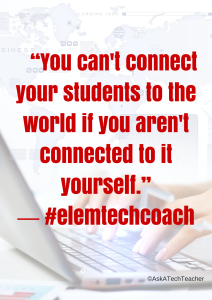Category: Online education
15 Take-aways from Online Grad School Classes
 MTI 562 (the Tech-infused Teacher) and MTI 563 (the Differentiated Teacher) just ended. More than a dozen of us–teachers, library media specialists, tech integrationists, lab teachers–gathered virtually for five weeks to experiment with some of the hottest tech tools available for the classroom–Google Apps, differentiation options, digital storytelling, visual learning, Twitter, blogs, backchannels, digital citizenship, assessment, and more. Sessions were run like a flipped classroom where attendees accessed daily topics, read/watched materials, tested their knowledge, and experimented with projects. In some cases, they failed and tried again–and shared with classmates what went wrong and how it was fixed–or how they attempted to fix it. They chatted with colleagues on discussion boards, blogs, and Twitter. They asked the class mentor (aka, guide or teacher) questions on class topics or any tech ed issue they needed help on. Once a week, we got together virtually (Google Hangout or TweetUp) to share ideas, answer questions, and discuss nuances.
MTI 562 (the Tech-infused Teacher) and MTI 563 (the Differentiated Teacher) just ended. More than a dozen of us–teachers, library media specialists, tech integrationists, lab teachers–gathered virtually for five weeks to experiment with some of the hottest tech tools available for the classroom–Google Apps, differentiation options, digital storytelling, visual learning, Twitter, blogs, backchannels, digital citizenship, assessment, and more. Sessions were run like a flipped classroom where attendees accessed daily topics, read/watched materials, tested their knowledge, and experimented with projects. In some cases, they failed and tried again–and shared with classmates what went wrong and how it was fixed–or how they attempted to fix it. They chatted with colleagues on discussion boards, blogs, and Twitter. They asked the class mentor (aka, guide or teacher) questions on class topics or any tech ed issue they needed help on. Once a week, we got together virtually (Google Hangout or TweetUp) to share ideas, answer questions, and discuss nuances.
Some of the problems students faced down:
- How to use twitter
- How to use GHO
- How to make a tagxedo interactive
- How to work tech tools into their unique student groups
- How to create screencasts and screenshots
- How to create professional blogs
- How to embed materials into digital portfolios
- How to create a vibrant, healthy Personal Learning Network
Now as I wave goodbye to these students I’ve only known five weeks but feel quite close to, here are my takeaways:
Share this:
- Click to share on Facebook (Opens in new window) Facebook
- Click to share on X (Opens in new window) X
- Click to share on LinkedIn (Opens in new window) LinkedIn
- Click to share on Pinterest (Opens in new window) Pinterest
- Click to share on Telegram (Opens in new window) Telegram
- Click to email a link to a friend (Opens in new window) Email
- More
11 Sites to Teach You How To…
 A wide variety of topics, with one thing in common–they teach you about technology in education:
A wide variety of topics, with one thing in common–they teach you about technology in education:
- Common Core training–the Hunt Institute
- Common Craft--videos on wikis, phishing, etc.
- How-to videos–technology, reading, math, more
- How to Videos for Web 2.0
- Internet Movie Database
- K-8 school-related videos. Tons
- Learn Zillion—teaching videos
- Teacher Training Videos
- Teaching Channel
- YouTube Education
- YouTube Pure—removes comments
Share this:
- Click to share on Facebook (Opens in new window) Facebook
- Click to share on X (Opens in new window) X
- Click to share on LinkedIn (Opens in new window) LinkedIn
- Click to share on Pinterest (Opens in new window) Pinterest
- Click to share on Telegram (Opens in new window) Telegram
- Click to email a link to a friend (Opens in new window) Email
- More
22 Tips on How to Work Remotely
 I first considered this topic at a presentation I attended through WordCamp Orange County 2014. I had several trips coming up and decided to see how I addressed issues of being away from my writing hub. Usually, that’s when I realize I can’t do/find something and say, “If only…”
I first considered this topic at a presentation I attended through WordCamp Orange County 2014. I had several trips coming up and decided to see how I addressed issues of being away from my writing hub. Usually, that’s when I realize I can’t do/find something and say, “If only…”
I am finally back from three conferences and a busy visit from my son–all of which challenged me to take care of business on the road and on the fly.
Truth is, life often interferes with work. Vacations, conferences, PD–all these take us away from our primary functions and the environment where we are most comfortable delivering our best work. I first thought about this when I read an article by a technical subject teacher(math, I think) pulled away from his class for a conference. Often in science/math/IT/foreign languages, subs aren’t as capable (not their fault; I’d capitulate if you stuck me in a Latin language class). He set up a video with links for classwork and a realtime feed where he could be available and check in on the class. As a result, students–and the sub–barely missed him. Another example of teaching remotely dealt with schools this past winter struggling with the unusually high number of snow days. So many, in fact, that they were either going to have to extend the school year or lose funding. Their solution: Have teachers deliver content from their homes to student homes via a set-up like Google Hangouts (but one that takes more than 10-15 participants at a time).
All it took to get these systems in place was a problem that required a solution and flexible risk-taking stakeholders who came up with answers.
Why can’t I work from the road? In fact, I watched a fascinating presentation from Wandering Jon at the Word Camp Orange County 2014 where he shared how he does exactly that. John designs websites and solves IT problems from wherever he happens to be that day–a beach in Thailand, the mountains in Tibet or his own backyard. Where he is no longer impacts the way he delivers on workplace promises.
Here’s what I came up with that I either currently use or am going to arrange:
Share this:
- Click to share on Facebook (Opens in new window) Facebook
- Click to share on X (Opens in new window) X
- Click to share on LinkedIn (Opens in new window) LinkedIn
- Click to share on Pinterest (Opens in new window) Pinterest
- Click to share on Telegram (Opens in new window) Telegram
- Click to email a link to a friend (Opens in new window) Email
- More
Technology and Online Education Give Students Magical Possibilities
Sara Stringer has a great post that mixes the miracle of technologic tools–straight out of StarTrek (or Harry Potter) with the current trend toward online education. I took my first online class when I got my teaching credential–and now I’m teaching them. Sara brings up a few benefits I hadn’t even considered.
My students are from the Harry Potter generation; the kids who grew up with Harry and his adventures are now adults, after all. I like to tease them about how many of the items that seemed magical in Harry’s world now exist, thanks to technology.
Take the animated GIF. When “moving photographs” first appeared in J.K. Rowling’s wizarding world, they seemed magic. Now, they’re one of the most common forms of digital media, and every one of my students knows how to make them.
Or, if you prefer, the Marauder’s Map. Why did we think that a map showing us the real-time location of our family and friends was something that could only exist at Hogwarts?
We are in an unprecedented age of technology, when nearly anything we want to create can come true. Though none of my students are old enough to have seen Star Trek when it first aired, I like to tease them about how cell phones were originally designed to replicate Star Trek communicators. Now, we have phones that will let us video chat with people anywhere in the world. We have 3D printers that are replicating human liver cells. Anything is possible.
Share this:
- Click to share on Facebook (Opens in new window) Facebook
- Click to share on X (Opens in new window) X
- Click to share on LinkedIn (Opens in new window) LinkedIn
- Click to share on Pinterest (Opens in new window) Pinterest
- Click to share on Telegram (Opens in new window) Telegram
- Click to email a link to a friend (Opens in new window) Email
- More
9 Reasons For Online Training and 5 Against
 A few weeks ago, I polled you-all about your interest in online training. The results were mixed. Setting aside the obvious reason that online classes are much more affordable for both offeror and offeree, here are some of the comments I got (I’ve summarized):
A few weeks ago, I polled you-all about your interest in online training. The results were mixed. Setting aside the obvious reason that online classes are much more affordable for both offeror and offeree, here are some of the comments I got (I’ve summarized):
For
- students can attend class from a car, their home, a library, while they’re waiting for their sister to finish ballet.
- classes are flexible–adaptable to student schedules
- online classes allow non-verbal students to participate fully with writing, drawing, and other non-audio approaches. This is a huge plus if the student is shy, easily intimidated and/or distracted by others
- class members in online classes are highly diversified, offering an opportunity for students to learn about different cultures, attitudes, and approaches to learning
- classes are self-paced–students move exactly as quickly or slowly as they want (with the fast forward and rewind)
- no distractions–students sit down and go to work without the chatter that usually starts a class, the goofing off that often distracts a lesson, and then interference from other students who don’t or won’t get whatever is included in the lesson
- no commuting, which means no traffic jams, no school house parking lots, less money spent on cars/gas/maintenance
- prepares students for future education in high schools and colleges
- content is managed through the online course framework, which means students can go back to review
Share this:
- Click to share on Facebook (Opens in new window) Facebook
- Click to share on X (Opens in new window) X
- Click to share on LinkedIn (Opens in new window) LinkedIn
- Click to share on Pinterest (Opens in new window) Pinterest
- Click to share on Telegram (Opens in new window) Telegram
- Click to email a link to a friend (Opens in new window) Email
- More
Do you like Online Training?
I have just started working with an online teacher training group called Curriculum Study Group. We offer online training to teachers via Google Hangouts, YouTube, instant feedback, and lots of collaborative learning. I am very excited to be part of this venture…
…but I must confess, before I joined, I wondered if teachers would be comfortable hanging out with like-minded professionals for an hour a week? Well, my good friend Amy over at CSG sent me this survey run by Project Tomorrow, a nonprofit group based in Irvine, Calif (my backyard). It seems they had the same question so did a poll. Here are the results:
What’s the take-away: Yes, across the board, principals and teachers are comfortable with online training.
Share this:
- Click to share on Facebook (Opens in new window) Facebook
- Click to share on X (Opens in new window) X
- Click to share on LinkedIn (Opens in new window) LinkedIn
- Click to share on Pinterest (Opens in new window) Pinterest
- Click to share on Telegram (Opens in new window) Telegram
- Click to email a link to a friend (Opens in new window) Email
- More
Connect Classrooms With Skype–How it’s Done
I first met Betsy Weigle over at Classroom Teacher Resources when I ran across a great how-to post she put together on Skyping in the classroom. The more I ran around her blog, the more impressed I became with her expertise and asked if she would do a guest post for my readers.
Betsy holds a Masters in Elementary Education & Teacher Certification from Eastern Washington University and earned her National Board Certification. She attended the Mickelson ExxonMobil Teaching Academy for Science and Math, been a national finalist at the Microsoft Innovative Education Forum and been awarded an Enhancing Education through Technology Grant. Her professional experience includes teaching grades 3 through 5 and substitute teaching from Kindergarten through 6th grade
I think you’ll enjoy this post:
Using Skype to Connect Classrooms
Share this:
- Click to share on Facebook (Opens in new window) Facebook
- Click to share on X (Opens in new window) X
- Click to share on LinkedIn (Opens in new window) LinkedIn
- Click to share on Pinterest (Opens in new window) Pinterest
- Click to share on Telegram (Opens in new window) Telegram
- Click to email a link to a friend (Opens in new window) Email
- More









































